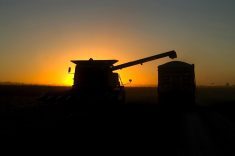By Theopolis Waters
CHICAGO, Feb 27 (Reuters) – Chicago Mercantile Exchange February live cattle futures settled down sharply following its noon CST expiration.
But, remaining contracts closed higher on their discounts to cash prices.
February ended 3.125 cents per pound lower at 158.000 cents, while April closed 1.900 cents higher at 151.700 cents and June up 0.900 cent to 143.850 cents.
On Friday, a small number of cash cattle in Nebraska moved at $158 to $159 per hundredweight (cwt.), steady to $2 lower than last week, a feedlot source said.
Kansas cash bids were at $159 versus $162 asking prices, according to feedlot sources.
Read Also

U.S. livestock: Cattle fall sharply as Trump says he’s working to lower beef costs
Chicago cattle futures fell sharply on Friday after U.S. President Donald Trump said his administration was working to lower the…
Some packers paid steady money for supplies based on vastly improved packer margins and near-record wholesale beef values. April future’s current price deterred other processors.
The afternoon Choice wholesale beef price gained 55 cents per cwt to $247.58 per cwt. from Thursday. Select cuts were up 0.67 cents to $245.57, based on USDA data.
Technical buying and live cattle gains lifted CME feeder cattle futures.
March closed 1.600 cents per lb. higher at 201.900 cents.
HOGS HIGHER
Lean hogs on Friday bounced back from Thursday’s losses, sparked by the uptick in wholesale pork values, traders said.
April futures closed up 0.325 cents per LB. to 67.475 cents, with May 0.600 cents higher at 79.900 cents.
Friday afternoon’s wholesale pork price jumped $2.38 per cwt. from Thursday to $70.51, the U.S. Department of Agriculture said.
Processors charged grocers more for pork, and lowered market-ready or cash hog bids, to limit cash spending and salvage their slipping margins.
USDA data showed the afternoon’s average cash hog price in Iowa/Minnesota slipped 12 cents per cwt. from Thursday to $66.26.
Until Friday, a series of winter storms battered the eastern half of the country, which delayed hog deliveries and drove up the cost for available livestock.
Meanwhile, pork demand struggled as East Coast residents brace for another wave of snowy weather while shippers work through the backlog of meat at West Cost ports.
The end of the West Coast port slowdown generated market enthusiasm but it will take a long time to clear product that backed up as a result, said University of Purdue agricultural economist Chris Hurt.














